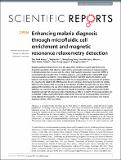Enhancing malaria diagnosis through microfluidic cell enrichment and magnetic resonance relaxometry detection
Author(s)
Fook Kong, Tian; Ye, Weijian; Peng, Weng Kung; Wei Hou, Han; Marcos, Han; Preiser, Peter Rainer; Nguyen, Nam-Trung; Han, Jongyoon; ... Show more Show less
DownloadKong-2015-Enhancing malaria.pdf (1.314Mb)
PUBLISHER_CC
Publisher with Creative Commons License
Creative Commons Attribution
Terms of use
Metadata
Show full item recordAbstract
Despite significant advancements over the years, there remains an urgent need for low cost diagnostic approaches that allow for rapid, reliable and sensitive detection of malaria parasites in clinical samples. Our previous work has shown that magnetic resonance relaxometry (MRR) is a potentially highly sensitive tool for malaria diagnosis. A key challenge for making MRR based malaria diagnostics suitable for clinical testing is the fact that MRR baseline fluctuation exists between individuals, making it difficult to detect low level parasitemia. To overcome this problem, it is important to establish the MRR baseline of each individual while having the ability to reliably determine any changes that are caused by the infection of malaria parasite. Here we show that an approach that combines the use of microfluidic cell enrichment with a saponin lysis before MRR detection can overcome these challenges and provide the basis for a highly sensitive and reliable diagnostic approach of malaria parasites. Importantly, as little as 0.0005% of ring stage parasites can be detected reliably, making this ideally suited for the detection of malaria parasites in peripheral blood obtained from patients. The approaches used here are envisaged to provide a new malaria diagnosis solution in the near future.
Date issued
2015-06Department
Massachusetts Institute of Technology. Department of Biological Engineering; Massachusetts Institute of Technology. Department of Electrical Engineering and Computer ScienceJournal
Scientific Reports
Publisher
Nature Publishing Group
Citation
Fook Kong, Tian, Weijian Ye, Weng Kung Peng, Han Wei Hou, Marcos, Peter Rainer Preiser, Nam-Trung Nguyen, and Jongyoon Han. “Enhancing Malaria Diagnosis through Microfluidic Cell Enrichment and Magnetic Resonance Relaxometry Detection.” Scientific Reports 5 (June 17, 2015): 11425.
Version: Final published version
ISSN
2045-2322